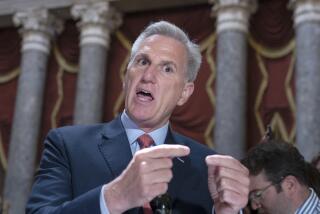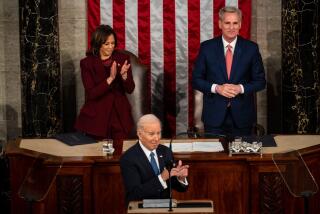Dole, Gingrich Take Cautious Aim at Medicare
WASHINGTON — Republican congressional leaders said Monday that the deficit-wary Congress will look for ways to cut Medicare spending as a way to slow the government’s skyrocketing health care spending.
The separate pronouncements by House Speaker Newt Gingrich (R-Ga.) and Senate Majority Leader Bob Dole (R-Kan.) confirmed what health care experts and budget analysts long have said: The $175 billion-a-year Medicare program cannot be exempt if Washington hopes to approach a balanced budget while providing for a middle-class tax cut.
The comments put the two leaders potentially at odds with powerful groups such as the American Assn. of Retired Persons, which have largely fended off past attempts to use cuts in Medicare to pay for other spending initiatives.
“If they are talking about a real dialogue to really do something about Medicare, we’re there,” said an AARP official. “But if it’s just Washington code words to cut the heck out of Medicare, then we’ll be up in arms.”
The cost of Medicare, which serves 32.4 million Americans over 65, plus another 4.4 million disabled persons, is growing 10% or more annually, about twice the inflation rate of overall health care spending.
In back-to-back speeches at the annual American Hospital Assn. meeting, Gingrich vowed to create a task force to “rethink Medicare from the ground up,” and Dole called for “a revamping” of the program.
They were short on details, but their words left little doubt that Medicare--as well as Medicaid, the federal-state health program for the poor--will come under intense scrutiny in the months ahead.
Dole delivered his warning after criticizing the unsuccessful efforts last year to enact health care reform that, he said, all but abandoned efforts to contain costs.
“We can’t afford to ignore this issue once again,” Dole said. “Of course, heading the list will be concerns about both Medicare and Medicaid. What we need to do is focus on how to do more with less--thinking smaller and thinking smarter. . . . It’s not easy. And it’s not fun. But we don’t have any choice.”
Gingrich told the hospital group that he fully supports Medicare’s “powerful and . . . legitimate” goals, which he defined as “to ensure that all of our parents and grandparents have access to health care and do not have to live their later years in fear.”
But he criticized the program’s “highly centralized bureaucratic structure offering one menu for everybody in a monopolistic manner. . . .
“And so we need to start from the senior citizens, with their help, thinking through how we get to a better Medicare system that actually works more effectively, that gives them greater choices but that is also financially more honest,” he said.
Meeting with reporters afterward, Gingrich said that his reference to increasing choices meant giving Medicare beneficiaries new options, such as enrollment in health maintenance organizations and the creation of tax-exempt medical savings accounts.
Last month, Gingrich suggested that retirees with annual incomes of more than $100,000 might be required in the future to buy their own health insurance, a move that would save the government about $6 billion in five years.
For 1993, the latest year for which government statistics are available, total Medicare and Medicaid spending by all government entities was $272 billion. Economists also have predicted that aggregate national health care spending will reach $1 trillion this year.
AARP officials reacted cautiously Monday afternoon after Gingrich’s and Dole’s comments reached them at their own annual legislative strategy meeting.
Martin Corry, AARP’s federal affairs director, said that the organization welcomes a discussion about Medicare. “It’s a good, strong program. It ought to be able to sustain that kind of debate. . . . The one caution we’d have is that it’s very difficult to have dialogue about transforming a program if we are, at the same time, locked into a debate about massive spending cuts in the program.”
More to Read
Get the L.A. Times Politics newsletter
Deeply reported insights into legislation, politics and policy from Sacramento, Washington and beyond. In your inbox three times per week.
You may occasionally receive promotional content from the Los Angeles Times.










